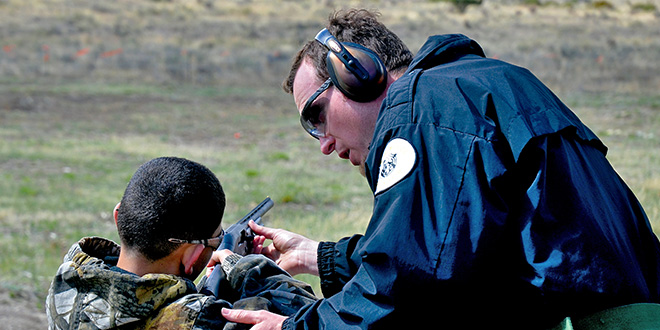Parents and youths are having fun learning at the new New Mexico Department of Game and Fish hunter education camps.
These camps deviate from the more traditional classroom-heavy learning experience. Instead, the focus is more interactive for eligible youths 11 years of age and older.
Any hunter in New Mexico under age 18 must have passed a hunter education class unless en-rolled in a Mentored-Youth Hunting Program.
“These camps are aimed at helping students learn the material by giving them a mixture of class time and hands-on training so they can become safe and ethical hunters,” said Jennifer Morgan, hunter education coordinator for Game and Fish.
The camps do not replace the traditional two-day classroom courses or the online opportunity, but provide another venue for individuals who grasp material better when there are more inter-active activities.
“The traditional classes are heavy on lecture followed by a written and proficiency exam,” Morgan said. “While this style works well for many students, others, such as those that have a hard time concentrating in such an environment, can benefit from the camp-style teaching.”
Students who participate in the camps embark on a busy, family-oriented class. They, along with a family member, interact more with other students in the camp environment, get hands-on training and shoot shotguns, .22 rifles and compound bows.
Even downtime is filled with activities.
“Evening events such as a scavenger hunt and S’mores around a campfire promote friendship and help ease the tension of being in a learning environment,” Morgan said.
Game and Fish personnel continue to learn the most efficient and effective activities and teach-ing styles for the camps. Few have been conduct-ed and, depending on location, are limited to 10-20 students plus a parent or legal guardian.
Camps begin with check-in on a Friday after-noon followed by dinner and instruction about the parts of a firearm, a review of firearm safety and the importance of eye dominance. Later, the students learn about zones of fire, firearm and ammunition matching, conservation, wildlife identification, fence crossing, safety on the trail, hunter ethics and firearms handling.
More hands-on activities take place Saturday.
In the afternoon, students have the opportunity to shoot and hone their firearms-handling skills on the range. The time on the range focuses on the importance of safe firearm use.
“This time on the range helps emphasize the importance of safe firearm handling before taking the final exam,” Morgan said. “Then, to break the tension, everyone sits around a campfire telling stories and making friends.”
Sunday involves a review-and-question session followed by the final exam and learning about survival, blood-trailing and game care.
The exam is no picnic. Game and Fish personnel take safety, finding the animal and proper care of the meat quite seriously. The youths learn the importance of different colored blood after the shot and how it relates to retrieving an animal.
There’s also information on best shot placement.
They also learn what should be done if lost in the wilderness and needing to spend a night in the field.
“I hope this program continues so our youths will be safe in the outdoors,” said Charles Pacheco, grandfather of a student. “The emphasis on safety and responsibility is important and it was covered thoroughly. The staff at Philmont Ranch also did a wonderful job making sure we were well-fed and comfortable.”
To ensure all students have the opportunity to listen and participate equally in the hands-on training portion, they are broken into small groups. The small groups allow instructors to have one-on-one training with the students to ensure they understand the material and techniques that were taught.
For more information on these camps and anything else related to hunter education, please contact the Hunter Education Department at 505-222-4731 or visit wildlife.state.nm.us/education/hunter-education.
 New Mexico Wildlife magazine Conserving New Mexico's Wildlife for Future Generations
New Mexico Wildlife magazine Conserving New Mexico's Wildlife for Future Generations
